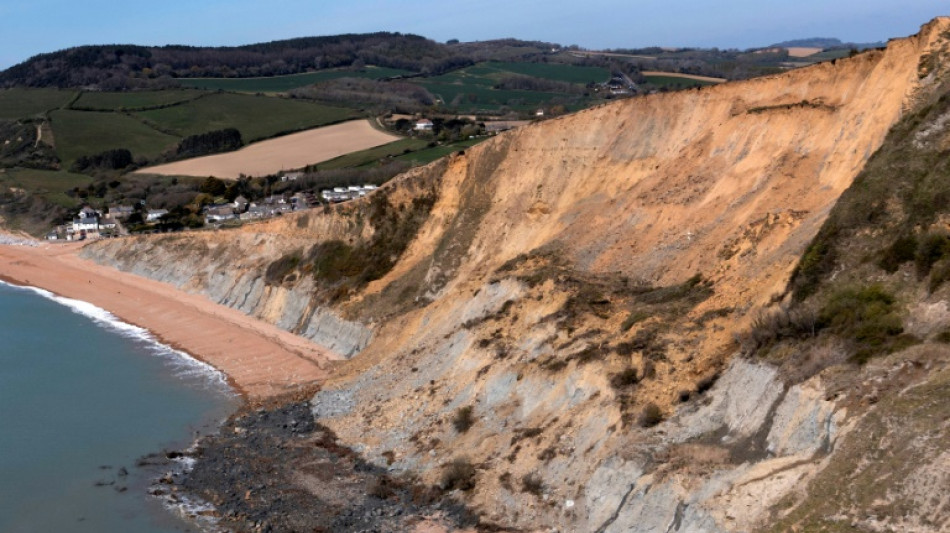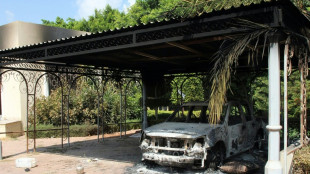
-
 Crypto firm accidentally sends $40 bn in bitcoin to users
Crypto firm accidentally sends $40 bn in bitcoin to users
-
Pistons end Knicks' NBA winning streak, Celtics edge Heat

-
 Funerals for victims of suicide blast at Islamabad mosque that killed at least 31
Funerals for victims of suicide blast at Islamabad mosque that killed at least 31
-
A tale of two villages: Cambodians lament Thailand's border gains

-
 Police identify suspect in disappearance of Australian boy
Police identify suspect in disappearance of Australian boy
-
Cuba adopts urgent measures to address energy crisis: minister

-
 Not-so-American football: the Super Bowl's overseas stars
Not-so-American football: the Super Bowl's overseas stars
-
Trump says US talks with Iran 'very good,' more negotiations expected

-
 Trump administration re-approves twice-banned pesticide
Trump administration re-approves twice-banned pesticide
-
Hisatsune leads Matsuyama at Phoenix Open as Scheffler makes cut

-
 Beyond the QBs: 5 Super Bowl players to watch
Beyond the QBs: 5 Super Bowl players to watch
-
Grass v artificial turf: Super Bowl players speak out

-
 Police warn Sydney protesters ahead of Israeli president's visit
Police warn Sydney protesters ahead of Israeli president's visit
-
Bolivia wants closer US ties, without alienating China: minister

-
 Ex-MLB outfielder Puig guilty in federal sports betting case
Ex-MLB outfielder Puig guilty in federal sports betting case
-
Milan-Cortina Winter Olympics open with dazzling ceremony

-
 China overturns death sentence for Canadian in drug case
China overturns death sentence for Canadian in drug case
-
Trump reinstates commercial fishing in protected Atlantic waters

-
 Man Utd can't rush manager choice: Carrick
Man Utd can't rush manager choice: Carrick
-
Leeds boost survival bid with win over relegation rivals Forest

-
 Stars, Clydesdales and an AI beef jostle for Super Bowl ad glory
Stars, Clydesdales and an AI beef jostle for Super Bowl ad glory
-
Dow surges above 50,000 for first time as US stocks regain mojo

-
 Freeski star Gu says injuries hit confidence as she targets Olympic treble
Freeski star Gu says injuries hit confidence as she targets Olympic treble
-
UK police search properties in Mandelson probe

-
 Bompastor extends contract as Chelsea Women's boss despite slump
Bompastor extends contract as Chelsea Women's boss despite slump
-
Milan-Cortina Winter Olympics open with glittering ceremony

-
 A French yoga teacher's 'hell' in a Venezuelan jail
A French yoga teacher's 'hell' in a Venezuelan jail
-
England's Underhill taking nothing for granted against Wales

-
 Fans cheer for absent Ronaldo as Saudi row deepens
Fans cheer for absent Ronaldo as Saudi row deepens
-
Violence-ridden Haiti in limbo as transitional council wraps up

-
 Hundreds protest in Milan ahead of Winter Olympics
Hundreds protest in Milan ahead of Winter Olympics
-
Suspect in murder of Colombian footballer Escobar killed in Mexico

-
 Colombia's Rodriguez signs with MLS Minnesota United
Colombia's Rodriguez signs with MLS Minnesota United
-
Wainwright says England game still 'huge occasion' despite Welsh woes

-
 WADA shrugs off USA withholding dues
WADA shrugs off USA withholding dues
-
France detects Russia-linked Epstein smear attempt against Macron

-
 Winter Olympics to open with star-studded ceremony
Winter Olympics to open with star-studded ceremony
-
Trump posts, then deletes, racist clip of Obamas as monkeys

-
 Danone expands recall of infant formula batches in Europe
Danone expands recall of infant formula batches in Europe
-
Trump deletes racist video post of Obamas as monkeys

-
 Colombia's Rodriguez signs with MLS side Minnesota United
Colombia's Rodriguez signs with MLS side Minnesota United
-
UK police probing Mandelson after Epstein revelations search properties

-
 Russian drone hits Ukrainian animal shelter
Russian drone hits Ukrainian animal shelter
-
US says new nuclear deal should include China, accuses Beijing of secret tests

-
 French cycling hope Seixas dreaming of Tour de France debut
French cycling hope Seixas dreaming of Tour de France debut
-
France detects Russia-linked Epstein smear attempt against Macron: govt source

-
 EU nations back chemical recycling for plastic bottles
EU nations back chemical recycling for plastic bottles
-
Terror at Friday prayers: witnesses describe blast rocking Islamabad mosque

-
 Iran expects more US talks after 'positive atmosphere' in Oman
Iran expects more US talks after 'positive atmosphere' in Oman
-
US says 'key participant' in 2012 attack on Benghazi mission arrested


Society centred around women in UK during Iron Age: scientists
Scientists analysing 2,000-year-old DNA have revealed that a Celtic society in the southern UK during the Iron Age was centred around women, backing up accounts from Roman historians, a study said Wednesday.
When historians such as Tacitus and Cassius wrote about Rome conquering Britain from around AD 44 to 84, they described women holding positions of power.
These include the famous warrior queen Boudica, who started an uprising against Roman occupation, sacking and burning several cities including Londinium -- which would one day become London. There was also Cartimandua, the 1st-century queen of the Brigantes people in northern England.
Julius Caesar, in his account of the Gallic Wars written more than more than century earlier, also described Celtic women participating in public affairs, exercising political influence -- and having more than one husband.
"When the Romans arrived, they were astonished to find women occupying positions of power," said Miles Russell, an archaeologist at Bournemouth University and co-author of the new study in Nature.
Some had doubted these accounts, suggesting "that the Romans exaggerated the liberties of British women to paint a picture of an untamed society," he told AFP.
"But archaeology, and now genetics, implies women were influential in many spheres of Iron Age life," he said.
"Indeed, it is possible that maternal ancestry was the primary shaper of group identities."
- Men moved on, women stayed put -
For the study, the team of researchers analysed more than 50 genomes extracted from burial sites in the village of Winterborne Kingston in southern England's Dorset county, which was populated before and after the Roman conquest.
Iron Age cemeteries with well-preserved burial sites are rare in Britain, perhaps because the dead were often cremated, stripped of their flesh and organs, or simply "deposited in wetlands", the researchers wrote.
However the Durotriges tribe, which occupied the southern central coastal region of England between 100 BC and AD 100 -- and gave their name to Dorset -- were an exception, burying their dead in cemeteries.
Excavations carried out at these sites since 2009 had already yielded some clues about the high social status women held in the tribe.
The "well-appointed graves across the Dorset Iron Age" containing drinking vessels, mirrors, beads and other goods were all female -- except for one that included a sword, said Russell, who led the excavations.
The DNA analysis showed that most of the people buried at the site were related through their maternal line, going "back to a single woman, who would have lived centuries before", said lead study author Lara Cassidy of Trinity College Dublin.
However there were almost no connections down the paternal line.
"This tells us that husbands moved to join their wives' communities upon marriage, with land potentially passed down through the female line," Cassidy said in a statement.
Societies centred around women -- which ethnographers call a "matrilocality" -- are rare throughout this period of history.
Yet the researchers trawled through previous research and "found signatures of matrilocality in a number of cemeteries across Britain dating to the Middle and Late Iron Age," from around 400 BC onwards, Cassidy said.
"However, it is quite possible this system was also common in the early Iron Age or perhaps even earlier."
F.AbuShamala--SF-PST


